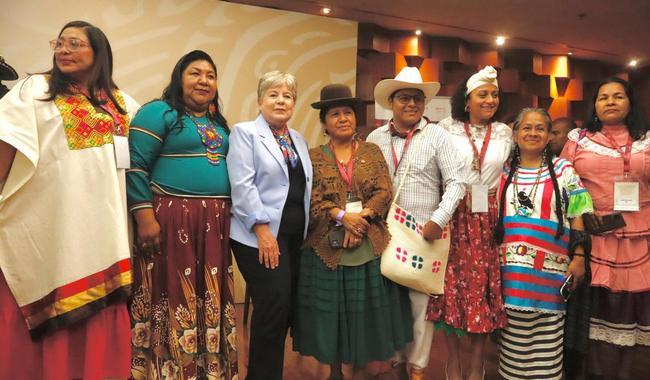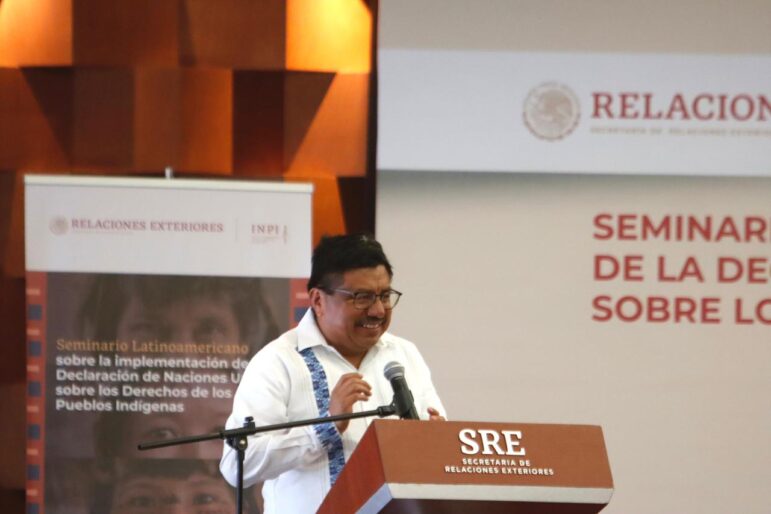MEXICO CITY – The Secretary of Foreign Affairs, Alicia Bárcena Ibarra, and the Director-General of the National Institute of Indigenous Peoples (INPI), Adelfo Regino Montes, inaugurated the Latin American Seminar: Advances and Challenges in Implementing the UN Declaration on the Rights of Indigenous Peoples, on its 17th anniversary. Attendees are expected to coordinate and formulate recommendations aimed at enhancing the effective implementation of the declaration across Latin American nations. The conference began on April 1, 2024.
The UN Declaration on the Rights of Indigenous Peoples is a document adopted by the United Nations General Assembly in 2007. It outlines the collective and individual rights of Indigenous peoples around the world, addressing issues such as self-determination, cultural integrity, land rights, education, and language preservation. The declaration aims to promote and protect the rights of Indigenous peoples, acknowledging their unique cultural, social, economic, and political situations. While it is not legally binding, it carries significant moral and political weight, serving as a framework for governments and organizations to uphold the rights of Indigenous peoples.
Over a span of three days, government experts and indigenous representatives from Argentina, Bolivia, Chile, Colombia, Costa Rica, Ecuador, Guatemala, Mexico, Panama, Peru, and Venezuela will engage in discussions regarding the advancements and hurdles in implementing the Declaration. The opening of the event was also attended by the president of the Council of the Traditional Government of the Chocholteco Ngigua-Ngiba People, Horacio Miguel Cruz; the coordinator of the National Council of Indigenous Peoples, Yaneth Cruz Gómez, and the president of the UN Permanent Forum on Indigenous Issues, Darío José Mejía Montalvo.

Foreign Secretary Alicia Bárcena with participants in Conference on UN Declaration on the Rights of Indigenous Peoples [via Goberno de México]
The dialogue will take place across four thematic roundtables: “Indigenous Peoples as Subjects of Collective Rights,” “Self-Determination and Indigenous Normative Systems,” “Lands, Territories, and Natural Resources,” and “Cultural Heritage.”
“In Latin America today, Indigenous peoples number around 45 million. We are talking about 826 Indigenous communities throughout the region and I believe that, in Mexico at least, our roots are deeply Indigenous and are a large part of our identity, and our foreign policy has to reflect that,” Bárcena Ibarra said while speaking to the national representatives of Indigenous peoples and diplomatic corps from throughout Latin America.
She underscored the need to redouble the efforts of all governments and organizations in fulfilling the vision of the Declaration across all nations in the region, ensuring the guarantee, protection, and promotion of the rights of Indigenous peoples.
Bárcena Ibarra noted the work of the current Mexican government under President Andrés Manuel López Obrador to amend Article 2 of the Mexican Constitution to acknowledge the rights of Indigenous and Afro-Mexican peoples on issues such as intellectual property, autonomy, self-determination, consultation, and consent.
Montes agreed, noting that Mexico has made significant strides in fulfilling its commitment to implement the UN Declaration on the Rights of Indigenous Peoples, as pledged during the 22nd session of the Permanent Forum on Indigenous Issues in 2023. He remarked how significant it is that the 20 initiatives introduced by the President on February 5, particularly emphasizing the constitutional reform proposal concerning the inherent rights of Indigenous and Afro-Mexican Peoples. He added that, at its core, the proposal reinforces the Indigenous right to self-determination articulated in Article 3 of the UN Declaration on the Rights of Indigenous Peoples.

Adelfo Regino Montes, Director-General of the National Institute of Indigenous Peoples (INPI), addresses the conference.
Bárcena Ibarra criticized nations that have failed to recognize the rights of Indigenous people in their constitutions. “It is good that Mexico does, it is good that Ecuador does, it is good that Bolivia does, but we still have a long way to go and I think that this is what we need to evaluate at this type of seminar, to see which path to follow and how to design multilateral instruments that will allow us to take that important step towards the turning point we are looking for,” she said.
Montes added that these reforms aimed at elevating the constitutional status of Indigenous people and communities will result in the protection of Indigenous cultural heritage, Indigenous intellectual property, and, perhaps most importantly, the protection of sacred sites.
The Wild Hunt is not responsible for links to external content.
To join a conversation on this post:
Visit our The Wild Hunt subreddit! Point your favorite browser to https://www.reddit.com/r/The_Wild_Hunt_News/, then click “JOIN”. Make sure to click the bell, too, to be notified of new articles posted to our subreddit.